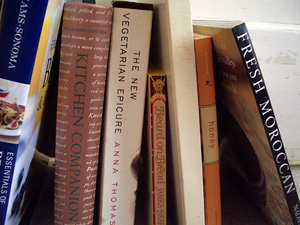 Last week, So You Want to Write a Cookbook: Part 1 offered some insider advice to would-be authors with Julia Child ambitions. Today, with Part 2, a few answers to those questions you didn't know to ask, from what makes a recipe yours to how to get an agent.
Last week, So You Want to Write a Cookbook: Part 1 offered some insider advice to would-be authors with Julia Child ambitions. Today, with Part 2, a few answers to those questions you didn't know to ask, from what makes a recipe yours to how to get an agent.
How do I create an original recipe?
1. Read cookbooks, and travelogues, and biographies and memoirs of interesting people from cultures that intrigue you. New cookbooks are the most seductive, of course, but the 641 section of the library is every food writer's friend. Other people's recipes can be a starting point; after all, you can't create your own pesto recipe without knowing the typical way a pesto is put together. Anything you taste, or even just read about, can be an inspiration for a recipe. The important part? Once you've got your idea, get in the kitchen and mess around. Measure, take notes, taste, take more notes, make it again. This is the part that is messy and time consuming, but the strength of your recipes depends on it.
Once you've got your recipes nailed down, pass them around. Get your mom, your friends (especially the ones who say they can't cook), and your neighbors to make these dishes. No hints, no tips, just what's written down. See if you can taste and take a look at what they produce.
As for the source of your inspiration, when in doubt, attribute. Cookbook author and former Bay Area pastry chef David Lebovitz recently posted a very useful article about copyrighting and fair play around recipes. Remember, even if you found something floating around on the internet with no attribution, it didn't get there by itself. Someone, somewhere created that recipe, and it's not yours until you've shaken it up, changed some ingredients, and re-written the instructions in your own voice.